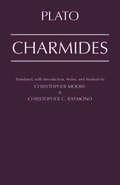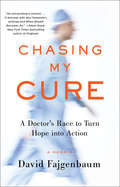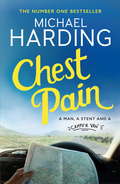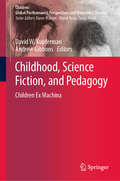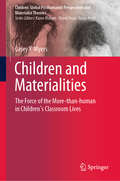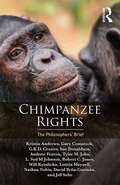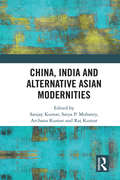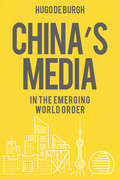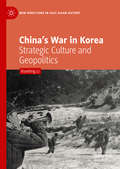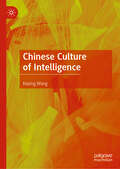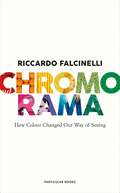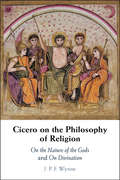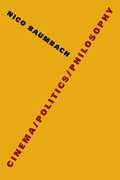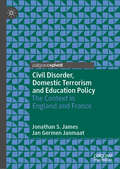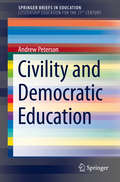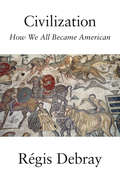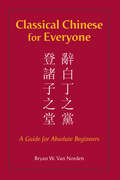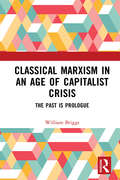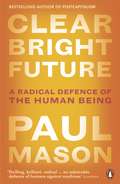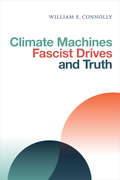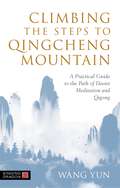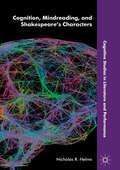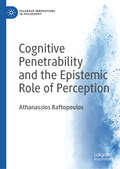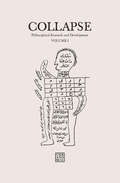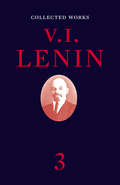- Table View
- List View
Charmides
by Plato"Moore and Raymond's Charmides is very impressive. The translation is excellent, and the Introduction and notes guide the reader into thorny problems in a way that renders them understandable: e.g., how to translate sôphrosunê, why we should care about self-knowledge, or how to seek to clarify important ethico-political concepts. The result provides almost all of what an instructor will need to introduce this unjustly neglected dialogue into a syllabus. Moreover, the volume is a wide-ranging resource for specialists. Students of the 'Socratic Dialogues' will profit greatly from this admirable contribution." —David J. Murphy is co-editor of Antiphontis et Andocidis Orationes (Oxford) and author of "The Basis of the Text of Plato's Charmides" (Mnemosyne) and many other contributions on the Charmides. He lives in New York City.
Chasing My Cure: A Doctor's Race to Turn Hope into Action; A Memoir
by David FajgenbaumThe powerful memoir of a young doctor and former college athlete diagnosed with a rare disease who spearheaded the search for a cure—and became a champion for a new approach to medical research.“An extraordinary memoir . . . It belongs with Atul Gawande’s writings and When Breath Becomes Air.”—Adam Grant, New York Times bestselling author of OriginalsDavid Fajgenbaum was a former Georgetown quarterback nicknamed the Beast in medical school, where he was also known for his unmatched mental stamina. But things changed dramatically when he began suffering from inexplicable fatigue. In a matter of weeks, his organs were failing and he was read his last rites. Doctors were baffled by his condition, which they had yet to even diagnose. Floating in and out of consciousness, Fajgenbaum prayed for the equivalent of a game day overtime: a second chance. Miraculously, Fajgenbaum survived—only to endure repeated near-death relapses from what would eventually be identified as a form of Castleman disease, an extremely deadly and rare condition that acts like a cross between cancer and an autoimmune disorder. When he relapsed while on the only drug in development and realized that the medical community was unlikely to make progress in time to save his life, Fajgenbaum turned his desperate hope for a cure into concrete action: Between hospitalizations he studied his own charts and tested his own blood samples, looking for clues that could unlock a new treatment. With the help of family, friends, and mentors, he also reached out to other Castleman disease patients and physicians, and eventually came up with an ambitious plan to crowdsource the most promising research questions and recruit world-class researchers to tackle them. Instead of waiting for the scientific stars to align, he would attempt to align them himself. More than five years later and now married to his college sweetheart, Fajgenbaum has seen his hard work pay off: A treatment that he identified has induced a tentative remission and his novel approach to collaborative scientific inquiry has become a blueprint for advancing rare disease research. His incredible story demonstrates the potency of hope, and what can happen when the forces of determination, love, family, faith, and serendipity collide.“A page-turning chronicle of living, nearly dying, and discovering what it really means to be invincible in hope.”—Angela Duckworth, #1 New York Times bestselling author of Grit
Chest Pain: A man, a stent and a camper van
by Michael HardingIn late 2018, Michael Harding was in a hotel room in Blanchardstown experiencing severe pains in his chest. He eventually phoned an ambulance and was admitted to hospital, suffering from an acute heart attack. Here, in Chest Pain, he looks at the months before the heart attack when he kept the signs of failing health from his beloved and instead retreated into solitude -- and with his own inimitable style and humour takes us with him through the months after a stent had been inserted in his heart, where he travels the roads of Donegal in a camper van in a journey back to the beloved, and to himself.Chest Pain is a thought-provoking, spell-binding memoir about togetherness and what it means to be alive.
Childhood, Science Fiction, and Pedagogy: Children Ex Machina (Children: Global Posthumanist Perspectives and Materialist Theories)
by David W. Kupferman Andrew GibbonsThis book invites readers to both reassess and reconceptualize definitions of childhood and pedagogy by imagining the possibilities - past, present, and future - provided by the aesthetic turn to science fiction. It explores constructions of children, childhood, and pedagogy through the multiple lenses of science fiction as a method of inquiry, and discusses what counts as science fiction and why science fiction counts. The book examines the notion of relationships in a variety of genres and stories; probes affect in the convergence of childhood and science fiction; and focuses on questions of pedagogy and the ways that science fiction can reflect the status quo of schooling theory, practice, and policy as well as offer alternative educative possibilities. Additionally, the volume explores connections between children and childhood studies, pedagogy and posthumanism. The various contributors use science fiction as the frame of reference through which conceptual links between inquiry and narrative, grounded in theories of media studies, can be developed.
Children and Materialities: The Force of the More-than-human in Children’s Classroom Lives (Children: Global Posthumanist Perspectives and Materialist Theories)
by Casey Y. MyersThis book makes the case for young children as both keenly materially aware of and highly dependent on sets of interrelated material-discursive circumstances. It argues that long-term engagement with children around the topic of meaning-matter relations upends many taken-for-granted notions of consumption, self-regulation, knowledge production, and what constitutes quality of life within a school setting.The book provides complex accounts of agency on multiple scales - the capability of children to shape and share research, the force of objects, stuff, and things to impact the "social" workings of a classroom, and the impact of nonhuman animals on the trajectory of the ways in which children relate to each other.This work makes a significant contribution to both theoretical conceptions and practical enactments of childhoods, productively addressing the many contradictions inherent in a posthuman and participatory approach to researching with young children. It also offers insights into how the everyday materialities of children’s classrooms (and their complex representations) are capable of disrupting the common-sense order of things.
Chimpanzee Rights: The Philosophers’ Brief
by Kristin Andrews Gary L Comstock Crozier G.K.D. Sue Donaldson Andrew Fenton Tyler M John L. Syd Johnson Robert C Jones Will Kymlicka Letitia Meynell Nathan Nobis David Pena-Guzman Jeff SeboSince 2013, an organization called the Nonhuman Rights Project has brought before the New York State courts an unusual request—asking for habeas corpus hearings to determine whether Kiko and Tommy, two captive chimpanzees, should be considered legal persons with the fundamental right to bodily liberty. While the courts have agreed that chimpanzees share emotional, behavioural, and cognitive similarities with humans, they have denied that chimpanzees are persons on superficial and sometimes conflicting grounds. Consequently, Kiko and Tommy remain confined as legal "things" with no rights. The major moral and legal question remains unanswered: are chimpanzees mere "things", as the law currently sees them, or can they be "persons" possessing fundamental rights? In Chimpanzee Rights: The Philosophers’ Brief, a group of renowned philosophers considers these questions. Carefully and clearly, they examine the four lines of reasoning the courts have used to deny chimpanzee personhood: species, contract, community, and capacities. None of these, they argue, merits disqualifying chimpanzees from personhood. The authors conclude that when judges face the choice between seeing Kiko and Tommy as things and seeing them as persons—the only options under current law—they should conclude that Kiko and Tommy are persons who should therefore be protected from unlawful confinement "in keeping with the best philosophical standards of rational judgment and ethical standards of justice." Chimpanzee Rights: The Philosophers’ Brief—an extended version of the amicus brief submitted to the New York Court of Appeals in Kiko’s and Tommy’s cases—goes to the heart of fundamental issues concerning animal rights, personhood, and the question of human and nonhuman nature. It is essential reading for anyone interested in these issues.
China, India and Alternative Asian Modernities
by Satya P. Mohanty Archana Kumar Raj Kumar Sanjay KumarThe conception of modernity as a radical rupture from the past runs parallel to the conception of Europe as the primary locus of global history. The essays in this volume contest the temporal and spatial divisions—between past and present, modernity and tradition, and Europe’s progress and Asia’s stasis—which the conventional narrative of modernity creates. Drawing on early modern Chinese and Indian history and culture instead, the authors of the book explore the provenance of modernity beyond the west to see it in a transcultural and pluralistic light. The central argument of this volume is that modernity does not have a singular core or essence—a causal centre. Its key features need to be disaggregated and new configurations and combinations imagined. By studying the Bhakti movement, Confucian democracy, and the maritime and agrarian economies of China and India, this book enlarges the terms of debate and revisits devalued terms and concepts like tradition, religion, authority, and rural as resources for modernity. This book will be of great interest to researchers and academicians working in the areas of history, Sociology, Cultural Studies, literature, geopolitics, South Asian and East Asian Studies.
China's Media in the Emerging World Order: how they came to be a powerful new force in media (Internationalizing Media Studies)
by Hugo De BurghChina is challenging the mighty behemoths, Google and Facebook, and creating alternative New Media. 750 million people are active on its Social Mediascape and there are a billion mobile phones deploying the innovative apps with which the Chinese conduct their lives.Though late starters, already four of the world's leading New Media companies are Chinese. China's old media - television, newspapers, radio - challenge the established powers which were long thought unassailable, such as CNN and BBC. Produced in many languages on every continent, they are re-defining the agenda and telling the story in China's way, with not just news and documentary series but also entertainment. The world's biggest manufacturer of TV drama is now making its stories for export.China's Media tells you why and how. It investigates the Chinese media, their strengths and weaknesses and how they are different. from the West. This detailed and comprehensive guide aims to showcase their immense variety and diversity, and demonstrates how they came to be a powerful new force in the media world.
China’s War in Korea: Strategic Culture and Geopolitics (New Directions in East Asian History)
by Xiaobing LiThis book re-visits the history of the Korean War of 1950-1953 from a Chinese perspective, examining Chinese strategy and exploring why China sent three million troops to Korea, in Mao’s words, to “defend the homeland and safeguard the country”—giving rise to what became the war’s common name in China. It also looks into the relatively neglected historical factors which have redefined China’s security concerns and strategic culture. Using newly available sources from China and the former Soviet Union, the book considers how interactive the parameters of defense changes were in a foreign war against Western powers, how flexible Chinese strategy was in the context of its intervention, and how expansive its strategic cultural repertoire was at the crucial moment to “defend the country.” Providing a re-examination of China’s military decisions and strategy evolution, this text narrates the story of successive generations of Chinese leaders and provides a key insight into security issues in China and Northeast Asia today.
Chinese Culture of Intelligence
by Keping WangWith the rise of China in the 21st century, this book offers a trans-cultural and thematic study of key Chinese concepts which influence modern day Chinese thinking across the spheres of politics, economics and society. It reflects on the major schools of Chinese thought including Confucianism, Daoism and Zen Buddhism, providing a historical perspective on the ideological development of China in terms of the relationship between man and nature, social ethics, political governance, poetry education, aesthetic criticism and art theory. It also explores primary aspects of Chinese poetics and aesthetics with reference to the interaction between the endogenous theories and their western counterparts. Written by a leader in Chinese Aesthetics against the background of both globalization and glocalization at home and abroad, this is a key read for all those interested in the cultural, philosophical and aesthetic underpinnings of contemporary China.
Chromorama: How Colour Changed Our Way of Seeing
by Riccardo FalcinelliThe Italian colour bible: a gorgeously illustrated exploration of colour and the modern gaze, from an award-winning designer'Fresh and exciting, like an unopened packet of coloured pencils. Countless thought-provoking facts to ponder over, beautifully written' Coralie Bickford-Smith, author of The Fox and the StarWhy are pencils yellow and white goods white? Why is black the colour of mourning? What connects Queen Victoria's mauve gown and Michelle Obama's yellow dress? In Chromorama, acclaimed graphic designer Riccardo Falcinelli delves deep into the history of colour to show how it has shaped the modern gaze. With over four hundred illustrations throughout and with examples ranging widely across art and culture - from the novels of Gustave Flaubert to The Simpsons, from Byzantine jewellery to misshapen fruit, from Mondrian to Hitchcock's thrillers - Falcinelli traces the evolution of our long relationship with colour, and how first the industrial revolution, and then the dawn of the internet age, changed it forever. Beautifully designed, deeply researched, and written with warmth and wit, Chromoroma is an engrossing account of shade and light, of tone and hue, of dyes, pigments, and pixels. It is the story of why we now see the world the way we do.
Cicero on the Philosophy of Religion: On the Nature of the Gods and On Divination
by J. P. WynneDuring the months before and after he saw Julius Caesar assassinated on the Ides of March, 44 BC, Cicero wrote two philosophical dialogues about religion and theology: On the Nature of the Gods and On Divination. This book brings to life his portraits of Stoic and Epicurean theology, as well as the scepticism of the new Academy, his own school. We meet the Epicurean gods who live a life of pleasure and care nothing for us, the determinism and beauty of the Stoic universe, itself our benevolent creator, and the reply to both that traditional religion is better served by a lack of dogma. Cicero hoped that these reflections would renew the traditional religion at Rome, with its prayers and sacrifices, temples and statues, myths and poets, and all forms of divination. This volume is the first to fully investigate Cicero's dialogues as the work of a careful philosophical author.
Cinema/Politics/Philosophy (Film and Culture Series)
by Nico BaumbachAlmost fifty years ago, Jean-Louis Comolli and Jean Narboni published the manifesto “Cinema/Ideology/Criticism,” helping to set the agenda for a generation of film theory that used cinema as a means of critiquing capitalist ideology. In recent decades, film studies has moved away from politicized theory, abandoning the productive ways in which theory understands the relationship between cinema, politics, and art. In Cinema/Politics/Philosophy, Nico Baumbach revisits the much-maligned tradition of seventies film theory to reconsider: What does it mean to call cinema political?In this concise and provocative book, Baumbach argues that we need a new philosophical approach that sees cinema as both a mode of thought and a form of politics. Through close readings of the writings on cinema by the contemporary continental philosophers Jacques Rancière, Alain Badiou, and Giorgio Agamben, he asks us to rethink both the legacy of ideology critique and Deleuzian film-philosophy. He explores how cinema can condition philosophy through its own means, challenging received ideas about what is seeable, sayable, and doable. Cinema/Politics/Philosophy offers fundamental new ways to think about cinema as thought, art, and politics.
Civil Disorder, Domestic Terrorism and Education Policy: The Context in England and France
by Jonathan S. James Jan Germen JanmaatThis book explores the links between education policy and occurrences of civil disorder and domestic terrorism in England and France. Since 2001, both England and France have experienced outbreaks of rioting in which young people of immigrant origin have been implicated: both have also been the targets of domestic terror attacks perpetrated by their own citizens. Both countries have had similar experiences of immigration since the end of the Second World War, but they are considered to have taken divergent approaches to immigrant integration and education. While Britain has tended towards a multicultural race relations approach, France veers towards a Republican assimilationist approach. Through the analysis of policy discourse and documents, the authors seek to establish whether these distinct approaches to immigrant integration and education policy have been maintained or whether they are converging. This book will appeal to students and scholars of education policy as well as immigration and integration in both France and England.
Civility and Democratic Education (SpringerBriefs in Education)
by Andrew PetersonThis book explores how and why civility contributes to a vibrant democratic society, and how it can be fostered and cultivated as a key part of democratic education. It suggests that civility only makes sense as a civic virtue if it is conceived in relation to civic friendship, concord and fellow-feeling. This book offers a timely snapshot of civility as a pressing, yet enduring, concern in democratic life and education. It elucidates a virtue-based conceptualization of civility and its place within democratic education, and makes use of real-life examples and cases to illustrate its arguments and to engage a range of readers. In short, this book is interested in what civility is and how schools can and do cultivate civility.
Civilization
by Regis DebrayAmerican civilisation's dominance over Europe - and what to do about it'Civilization' -- a hard term to define. But while every society has a distinctive culture, authentic civilizations must offer those they subjugate an attractive way of life. Their imprint outlasts their imperium.A century ago, Debray argues, there was a European civilization of which America was an outlying culture; but today the relationship is reversed. 'In 1900, an American of taste was a European in exile; in 2000, a trendy European is a frustrated American - or one waiting for a visa'. Characteristic of American civilization is its three overarching fetishes: space, image and happiness. America is a civilization of space and image, whereas Europe was one of time and writing. And its kitsch infantilism blinds itself to the tragic complexities of human life. A measure of America's success is how its 'globish' jargon has so successfully infiltrated European languages.For Debray, the dominance of American civilization is a historical fait accompli, yet he sees a model for Europe in Vienna after its exclusion from the German Reich. For decades to come, Europe can still offer a rich cultural seedbed. 'Some will call it decadence, others liberation. Why not both?'
Classical Chinese for Everyone: A Guide for Absolute Beginners
by Bryan W. Van NordenIn just thirteen brief, accessible chapters, this engaging little book takes "absolute beginners" from the most basic questions about the language (e.g., what does a classical Chinese character look like?) to reading and understanding selections from classical Chinese philosophical texts and Tang dynasty poetry. "An outstanding introduction to reading classical Chinese. Van Norden does a wonderful job of clearly explaining the basics of classical Chinese, and he carefully takes the reader through beautifully chosen examples from the textual tradition. An invaluable work." —Michael Puett, Harvard University
Classical Marxism in an Age of Capitalist Crisis: The Past is Prologue
by William BriggsWill capitalism survive forever? Capitalism has always lived in and with crisis. Wars, revolutions, economic depression and repeated recessions, the threat of nuclear annihilation and ecological disaster have all failed to break the dominance of this economic and political system. Challenging the predominance of capitalism in a world fraught with inequalities, this book returns to classical Marxism to reaffirm its relevance. It explores the contradictions within capitalism as well as explaining why Marxism has been unable to mount a sustained challenge to capitalism. In order to explore concrete alternatives in a period of increasing capitalist globalisation and crisis, it goes on to present perspectives by which theory and practice might be reunited to building independent political and organisational structures. A search for “something better”, this volume will be an engaging read for scholars and researchers of politics, especially political theory and political economy, economics, and sociology.
Clear Bright Future: A Radical Defence of the Human Being
by Paul MasonA passionate defence of humanity and a work of radical optimism from the international bestselling author of PostcapitalismHow do we preserve what makes us human in an age of uncertainty? Are we now just consumers shaped by market forces? A sequence of DNA? A collection of base instincts? Or will we soon be supplanted by algorithms and A.I. anyway?In Clear Bright Future, Paul Mason calls for a radical, impassioned defence of the human being, our universal rights and freedoms and our power to change the world around us. Ranging from economics to Big Data, from neuroscience to the culture wars, he draws from his on-the-ground reporting from mass protests in Istanbul to riots in Washington, as well as his own childhood in an English mining community, to show how the notion of humanity has become eroded as never before.In this book Paul Mason argues that we are still capable - through language, innovation and co-operation - of shaping our future. He offers a vision of humans as more than puppets, customers or cogs in a machine. This work of radical optimism asks: Do you want to be controlled? Or do you want something better?
Climate Machines, Fascist Drives, and Truth
by William E. ConnollyIn this new installation of his work, William E. Connolly examines entanglements between volatile earth processes and emerging cultural practices, highlighting relays among extractive capitalism, self-amplifying climate processes, migrations, democratic aspirations, and fascist dangers. In three interwoven essays, Connolly takes up thinkers in the "minor tradition" of European thought who, unlike Cartesians and Kantians, cross divisions between nature and culture. He first offers readings of Sophocles and Mary Shelley, asking whether close attention to the Anthropocene could perhaps have arrived earlier had subsequent humanists absorbed their lessons. He then joins Deleuze and Guattari's notion of an abstract machine with contemporary earth sciences, doing so to compare the Antique Little Ice Age of the late Roman empire to contemporary relays between extractive capitalism and accelerating climate processes. The final essay stages a dramatic dialogue between Alfred North Whitehead and Michel Foucault about the pursuit of truth during a time of planetary turbulence. With Climate Machines Fascist Drives, and Truth, Connolly forges incisive interventions into key issues of our time.
Climbing the Steps to Qingcheng Mountain: A Practical Guide to the Path of Daoist Meditation and Qigong
by Wang YunMount Qingcheng, one of China's mystical mountains, has been the birth place of discovery, realization and preservation of the recipes that stimulate the deep potential of the human body for generations. This is the book of a Daoist master and spiritual guide Wang Yun as a young seeker and tells the tales of his inner journey which now guides the reader on a path of healing, rejuvenation and actualization of the body's innate potential.Climbing the Steps to Qingcheng Mountain brings Wang Yun's knowledge and wisdom to the West for the first time. · It serves as a guide to health and spiritual practices· including meditation and qigong exercises · based on centuries of Daoist knowledge and wisdom. · Through tales ranging from Daoist immortals to sleep-deprived salesmen, · this book offers guidance to support physical and mental wellbeing in this modern, stressful world.For a preview, exercise videos and more about the author:www.modernwisdomtg.com
Cognition, Mindreading, and Shakespeare’s Characters (Cognitive Studies In Literature And Performance Ser.)
by Nicholas R. HelmsCognition, Mindreading, and Shakespeare's Characters brings cognitive science to Shakespeare, applying contemporary theories of mindreading to Shakespeare’s construction of character. Building on the work of the philosopher Alvin Goldman and cognitive literary critics such as Bruce McConachie and Lisa Zunshine, Nicholas Helms uses the language of mindreading to analyze inference and imagination throughout Shakespeare’s plays, dwelling at length on misread minds in King Lear, Much Ado About Nothing, Othello, and Romeo and Juliet. Shakespeare manipulates the mechanics of misreading to cultivate an early modern audience of adept mindreaders, an audience that continues to contemplate the moral ramifications of Shakespeare’s characters even after leaving the playhouse. Using this cognitive literary approach, Helms reveals how misreading fuels Shakespeare’s enduring popular appeal and investigates the ways in which Shakespeare’s characters can both corroborate and challenge contemporary cognitive theories of the human mind.
Cognitive Penetrability and the Epistemic Role of Perception (Palgrave Innovations in Philosophy)
by Athanassios RaftopoulosThis book is about the interweaving between cognitive penetrability and the epistemic role of the two stages of perception, namely early and late vision, in justifying perceptual beliefs. It examines the impact of the epistemic role of perception in defining cognitive penetrability and the relation between the epistemic role of perceptual stages and the kinds (direct or indirect) of cognitive effects on perceptual processing. The book presents the argument that early vision is cognitively impenetrable because neither is it affected directly by cognition, nor does cognition affect its epistemic role. It also argues that late vision, even though it is cognitively penetrated and, thus, affected by concepts, is still a perceptual state that does not involve any discursive inferences and does not belong to the space of reasons. Finally, an account is given as to how cognitive states with symbolic content could affect perceptual states with iconic, analog content, during late vision.
Collapse: Philosophical Research and Development (Urbanomic #Vol. 1)
by Robin MackayAn investigation of the nature and philosophical uses of number. The first volume of Collapse investigates the nature and philosophical uses of number. The volume includes an interview with Alain Badiou on the relation between philosophy, mathematics, and science, an in-depth interview with mathematician Matthew Watkins on the strange connections between physics and the distribution of prime numbers, and contributions that demonstrate the many ways in which number intersects with philosophical thought—from the mathematics of intensity to terrorism, from occultism to information theory, and graphical works of multiplicity.
Collected Works, Volume 3
by V. I. LeninRe-launch of the Collected Works of the legendary revolutionary in paperbackAmong the most influential political and social forces of the twentieth century, modern communism rests firmly on philosophical, political, and economic underpinnings developed by Vladimir Ilyich Ulyanov, later known as Lenin. For anyone who seeks to understand capitalism, the Russian Revolution, and the role of communism in the tumultuous political and social movements that have shaped the modern world, the works of Lenin offer unparalleled insight and understanding.
